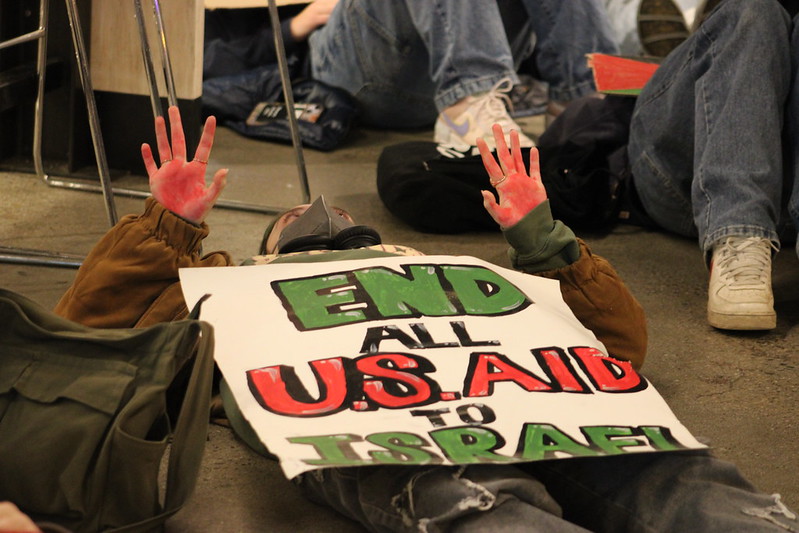On Tuesday, Feb. 27, Michigan held its presidential primary elections, with President Joe Biden winning the Democratic primary and former President Donald Trump winning the Republican primary. What was an expected victory for both men turned into a warning for President Biden; the primary saw an organized protest effort against Biden’s handling of the war in Gaza. Over 100,000 Michigan voters went to the polls to vote “uncommitted” in the Democratic primary. This is worrying for the Biden campaign as he won Michigan by a margin of 150,000 votes in 2020.
Led by young, progressive organizers, the movement was amplified by the support of the majority leader in the Michigan House of Representatives and several members of Congress. As election season heats up, Biden’s electoral base, which was crucial in drumming up support for his 2020 campaign, is beginning to show cracks as discontentment and dissatisfaction start to bubble.
News of the uncommitted movement has dominated the headlines, and relics of a similar period in American politics have begun to spring. From August 26-29, the Democratic Convention of 1968 was bathed in the chaos of the Vietnam War and Civil Rights Movement. Progressive groups, who protested President Johnson and his allies, were met with violence in what marked the beginning of the end of New Deal Democratic dominance and the trust in government that was the foundation of almost 200 years of democracy. Could the war in Gaza be a watershed moment for young people, just like the war in Vietnam?
We must recognize the contrast between both periods. Americans were drafted for the war in Vietnam. Young people of the era were directly harmed by the actions of the federal government. Currently, Americans have not taken part in direct conflict in this war. To those who think this comparison is an over-exaggeration, I recognize this difference. But I am not arguing that the war in Gaza – as tragic and demoralizing as any conflict could be – is as directly harmful to young Americans as the war in Vietnam. I am worried about the further erosion of trust between young Americans and the government, just as trust was eroded in the Vietnam era.
On Aug. 4, 1964, the USS Maddox reported an ambush in what became known as the Gulf of Tonkin Incident. As a result, Congress passed the Gulf of Tonkin Resolution, which gave the president the ability to take any necessary action against the North Vietnamese. This was the beginning of large-scale involvement in Vietnam. Hundreds of thousands of American men were sent to die in a far-off land for a supposedly noble cause.
Yet in 1971, Daniel Ellsberg leaked the Pentagon Papers, which showed that American involvement in Vietnam was based on falsehoods. Pretexts for further aggression, like the Gulf of Tonkin Incident, were all lies. Television news blasted the American public with images of a failing and costly war, which horrified viewers. Two years after the Pentagon Papers, the United States pulled out of South Vietnam, and Saigon fell shortly after. Thousands of American soldiers and millions of Vietnamese people died for naught.
At the same time, five men were arrested for breaking into the Democratic National Committee headquarters at the Watergate Hotel, which brought down the presidency of Richard Nixon. Inflation reached record highs, the economy was stagnant and oil prices skyrocketed. America seemed like it was collapsing, and the public lost all confidence in the government. Trust in government fell from 77 percent at the beginning of the Johnson administration to less than 30 percent at the end of the Carter administration. As a result, a small government conservative named Ronald Reagan, who championed a new era of neoliberalism, the dismantling of the social safety net, a racist drug policy and a ballooning national debt was elected in a landslide in 1980.
Today, especially for young people, the same anxieties have dominated. Over 65 percent of Americans report feeling anxious about their current financial situations, with higher rates amongst young people. A majority of Americans disapprove of Israel’s actions in Gaza and President Biden’s handling of the war in Gaza, with younger Americans showing higher rates of disapproval. This is coupled with the rollback of abortion rights, failed promises on student loans and a crushing cost of living crisis.
It is a chaotic time in America, just as it was 50 years ago. Trust in government has reached all-time lows. What will happen to American democracy? Time and time again, distrust in institutions leads to authoritarian and populist movements. We have already seen the rise of a chauvinistic populist who is running for president, even after attempting to dismantle our system of government, and he has a legitimate chance to become president once more. Will this moment prove to be our Vietnam? Will young people turn this distrust and discontent into destructive retribution towards our democratic institutions, or will I (hopefully) be proven incorrect?
Samuel Cavalheiro can be reached by email at [email protected] or on X @samcavalheiro1.



















